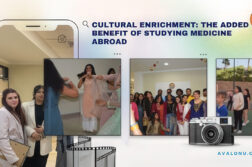Source: iie.org
International experience used to be a “nice-to-have” criterion in a graduate’s resume. Today, it has become one of the most important components of a 21st century education. Many new studies show a direct impact of study abroad on creativity, cognitive ability, and student success. In addition, studies show that study abroad plays an important role in developing a global mindset and skills necessary to succeed in the workforce. Below are studies showing the value employers place on international experience and whether a graduate’s career prospects actually improve as a result of this experience.
Career Success
The Erasmus Impact Study: Effects of Mobility on the Skills and Employability of Students and the Internationalisation of Higher Education Institutions
This independent study prepared for the European Commission finds that internationally mobile students have better chances of finding a job after graduation. Their unemployment rate five years after graduation is lower than non-mobile students. Results show that around 65 percent of employers consider international experience important for recruitment, and over 90 percent are looking for transversal skills enhanced by study abroad, such as openness and curiosity about new challenges, problem-solving, and decision-making skills.
Gone International: Mobile Students and Their Outcomes; Report on the 2012/13 Graduating Cohort
This UK Higher Education International Unit report finds that graduates who had studied, worked, or volunteered abroad were more likely to be employed within six months of graduation. The data also shows a significantly lower proportion of graduates from disadvantaged backgrounds who were mobile were unemployed compared with those from the same backgrounds who were not mobile. Graduates with international study experience earned more, on average, than other graduates.
Recent Graduates Survey: The Impact of Studying Abroad on Recent College Graduates’ Careers
The IES Abroad Recent Graduate Study shows that study abroad alumni find jobs sooner after graduation, related to their majors, and at a higher starting salary. Study abroad students also have better graduate and professional school acceptance rates. Ninety-seven percent of alumni secured a job within one year after graduation, compared to 49 percent in the general college graduate population.
Career Readiness
Expanding Opportunity by Opening Your Mind: Multicultural Engagement Predicts Job Offers Through Longitudinal Increases in Integrative Complexity. Social Psychological and Personality Science, 5(5), 608-615
This study by Maddux et al. shows that the extent to which students adapted to and learned about new cultures (multicultural engagement) during a highly international 10-month master of business administration program predicted the number of job offers students received after the program, even when controlling for important personality and demographic variables.
GLOSSARI – Georgia Learning Outcomes of Students Studying Abroad Research
An assessment by the University System of Georgia found that students who studied abroad had a 17.8-percent higher 4-year graduation rate than those who did not study abroad, particularly among underrepresented minority and low income students.
Employer Perspective
The Outcomes of Outbound Student Mobility
This summary of academic literature over a 50-year period by AIM Overseas shows that over 60 percent of employers agree that an overseas study experience is a positive on a résumé. Additionally, 72 percent of employers agree that knowing a second language adds to the appeal of a prospective employee.
How Employers Value an International Study Experience
Based on responses from 10,000 recruiters worldwide, this QS Global Employer Report found that employers are looking for the skills and experience gained through the overseas study experience when hiring graduates.
Faktaa – Facts and Figures: Hidden Competencies
Prior studies mention that employers value international experience. This study by CIMO and Demos Helsinki concludes that employers recognize only those skills that are traditionally linked to international experience like tolerance, language skills and cultural knowledge. A substantial number of skills that are also linked to mobility were not visible to employers. The study concludes that young people need more guidance in making competencies such as productivity, resilience and curiosity gained from their international experiences more visible.
This post was originally published in the fall 2015 edition of IIENetworker magazine, “The Impact of International Education.” This issue analyzes distinct aims of international education and discusses ways to improve how we measure its success.








Discussion1 Comment
This is good plan for those who are rich but what for a poor people.